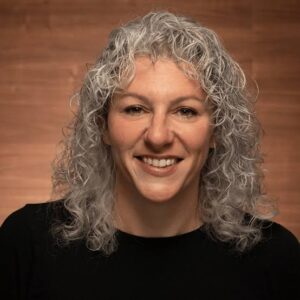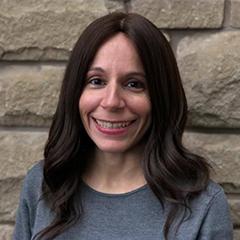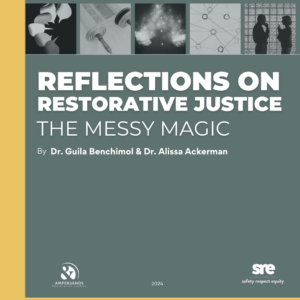Reflections on Restorative Justice
The Messy Magic
A Report by Dr. Guila Benchimol and Dr. Alissa Ackerman
“We invite you to engage with us in continuing to think about how to better build a Jewish world that honestly grapples with the challenges and possibilities of accountability and repair. We will continue to ask these difficult questions and look for answers.”
- Drs. Alissa Ackerman and Guila Benchimol
Over the past six years, Drs. Guila Benchimol and Alissa Ackerman have trained on and/or facilitated institutional restorative justice (RJ) processes within 15 Jewish organizations, drawing on their academic backgrounds in criminology and sociology and their experiences as victim-survivors to inform this work.
The following qualitative, auto-ethnographic report reflects on the authors’ collaborative, survivor-centered and trauma-informed approach to restorative justice, accountability, and repair. They offer seven reflections, framed around the significance of the number seven in Judaism, that offer answers to what restorative justice is, the unique complexities of applying this process in Jewish institutions, and the limitations and misunderstandings about institutional RJ.
This report explores what the magic of RJ, accountability, and teshuva can look like in Jewish spaces. We are grateful to the authors for sharing their wisdom.
Guila and Alissa also published an op-ed delving into the report's insights. Read it here.
“Faith is not certainty; it is the courage to live with uncertainty. Faith does not mean seeing the world as you would like it to be; it means seeing the world exactly as it is, yet never giving up the hope that we can make it better by the way we live.” – Lord Rabbi Jonathan Sacks z”l, Letters to the Next Generation: Reflections for Yom Kippur
Restorative Justice in Action
During SRE Network's 2024 Convening, Rabbi Rick Jacobs, Rabbi Marina Yergin, Rabbi Mary Zamore, and moderators Dr. Alissa Ackerman & Dr. Guila Benchimol, came together for a session called "The Restorative Justice Triad" to shine a spotlight on the deeply transformative work of restorative justice to address harm within Jewish institutional life. Watch the session here.
*CW: This session discusses the experiences of those who have experienced sexual harm and other forms of harm in Jewish spaces.
About the Authors

Dr. Alissa R. Ackerman holds a PhD in Criminal Justice from The Graduate Center at The City University of New York. She is an Associate Professor of Criminal Justice at California State University, Fullerton. She is also the co-founder and owner of Ampersands Restorative Justice, where she is a trainer, consultant, and restorative justice practitioner. She is a “pracademic” and “survivor scholar” in that she incorporates her academic training, practitioner, and personal experiences with sexual violence in her work. Alissa writes extensively on topics related to sexual violence and offending, restorative practices, and sex crime policies in academic journals, books, and OpEds. She has published almost 40 peer-reviewed journal articles and 8 books. She co-authored Healing from Sexual Violence: The Case for Vicarious Restorative Justice, with Dr. Jill Levenson in 2019 and her most recent co-edited volume, Survivor Criminology: A Radical Act of Hope, was released in 2022. Alissa is an internationally sought after speaker and trainer, having given over fifty national and international talks, including a TEDx Talk in 2018. She is an internationally sought-after speaker, consultant, and trainer. Along with Casey Ballinger, MSW, Alissa is the co-recipient of the 2024 Gail Burns-Smith Award.

Dr. Guila Benchimol is a criminologist, consultant, educator and victim advocate who works with survivors, faith institutions, and leaders to prevent and address sexual violence and other abuses of power. She was one of the key advisors who guided the launch of the Safety Respect Equity (SRE) Network in 2018, where she continues to serve as the Senior Advisor on Research and Learning. Guila is also the Director of Faith-Based and Community Accountability at Ampersands Restorative Justice and the Ethics Case Consultant for the Va’ad Hakavod of the Rabbinical Assembly. Guila also sits on the board of the Survivors Network of those Abused by Priests (SNAP), and is a research associate at the Center for the Study of Social and Legal Responses to Violence where she has worked on domestic violence and homicide files. She holds a PhD in Sociological Criminology from the University of Guelph and is also a trained restorative and transformative justice facilitator. Her first 10+ year career as a Jewish educator informed her understanding of the need to address victimization of all kinds. Previously, Guila was the Director of Judaic Studies at Tiferes Bais Yaakov and the Managing Director of NCSY Canada. She lives in Toronto and was raised in its Spanish Moroccan Jewish community which was built by the families who fled Tangier.
SRE Network is proud to have invested in the development of this report.
For questions, email info@srenetwork.org.

